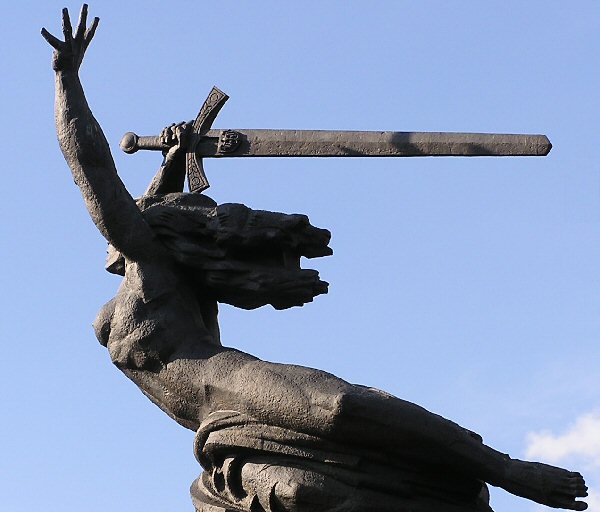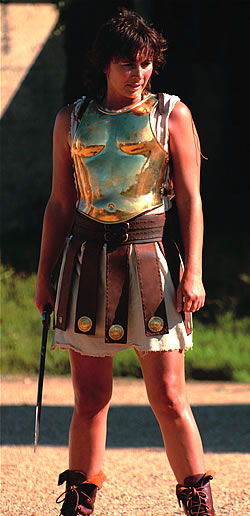 The Roma Nova heroines – Carina and Aurelia Mitela – are ‘tough gals’; dedicated, strong-willed, physically and mentally resilient and tied into their sense of history and duty. Underlying all this, their driving force is their self-belief.
The Roma Nova heroines – Carina and Aurelia Mitela – are ‘tough gals’; dedicated, strong-willed, physically and mentally resilient and tied into their sense of history and duty. Underlying all this, their driving force is their self-belief.
Carina, despite her disrupted childhood and separation from Roma Nova until she was twenty-four, has embraced Roma Novan values and system wholeheartedly, although, of course, there are gaps that trip her up. Aurelia is a ‘blood-and-bone’ Roma Novan, so completely immersed in the society from birth, but has her own weaknesses.
Neither of these women denies their femininity or personal and sexual needs; they are as emotionally wired as any other person. They fail, fear, experience inadequacy and guilt (and have tempers), but they don’t let any of this diminish them, their motivation or their innate sense of doing the right thing. Aurelia from the outset, and Carina as she becomes more immersed into Roma Nova, are not judged on their gender, nor do they allow themselves to even think that is a criterion for judgement.
In Roma Nova, a society that has survived by vigilance and robust resistance to those who would destroy or absorb it, no quarter is given or allowance made for gender, only for behaving or performing as the person you are.
As Carina and Aurelia say, you’re only as good as your last job.
So, that brings us on to the Roma Novan men – Conrad, Apollodorus, Lurio, for instance. All different characters but tough and masculine. I’d like to see anybody talk to Lurio and call him a softie. I’ll hold your coat while you try. Conrad would be more polite – he has better manners, but Apollodrus would have you removed and, er, disposed of if you dared to make that suggestion.
However, the crucial note of this alternative society is that there is no right of men’s automatic superiority. As they were steadfast pagans, worshipping the traditional Roman goddesses and gods, there was no incursion of paternalistic monotheistic religions.
In the early history of the Colonia Apuliensis Roma Nova, women had to fight alongside men to protect the infant colonia in the fraught period of the late fourth and early fifth centuries. And of course, founder Apulius had four strong daughters whose mother was a tough, independent Celt from Noricum where women managed property, took decisions in the political process and when necessary hefted a blade.
Back to the men… In Roma Nova, there is little of the gender pressure on male children and youngsters as they grow up such as the ‘big boys don’t cry’ and the ‘man up’ culture.
Naturally enough, there is sibling and peer rivalry; testosterone flows in Roma Nova as anywhere else. However, men are expected to act and live as any other Roma Novan, as selfish or achieving as anybody else. But there is no pressure to behave in line with a constructed gender pattern. This frees up men from the pressure of conditioned norms expected in many societies.
Conrad is tough, clever, resourceful and a bit cocky, to be honest. Serving in the Praetorian Guard Special Forces is ideal for him as it provides structure and a place to demonstrate his decisiveness and moral strength. He expects the soldiers under his command to obey not based on any gender considerations but on his authority in the military context. Ditto Lurio, but in a more relaxed, if brash, way. Apollodorus commands through fear, but has a weakness as far as Carina is concerned, as we find out in PERFIDITAS.
Naturally enough, this ‘egalitarian-plus’ type of society can lead to conflict, especially when Roma Novans come up against outsiders – a gift for any novelist. In AURELIA, set in the late 1960s, the first adventure featuring Aurelia Mitela as a young woman serving in the Praetorian Guard, conflict is rife. Not just in the story.
It’s hard to remember just how casual and taken for granted sexism was at that time as Aurelia discovers when she travels outside Roma Nova on a mission to Berlin. Being Aurelia, she confronts it or ignores it depending on the circumstances, but never allows it to affect her mission or her intrinsic values. But when she meets another equally independently-minded soul, she knows she has found her life’s love. Yet she still steers her own course as we go on to see in INSURRECTIO and RETALIO.
Updated for March 2024: Alison Morton is the author of Roma Nova thrillers – INCEPTIO, CARINA (novella), PERFIDITAS, SUCCESSIO, AURELIA, NEXUS (novella), INSURRECTIO and RETALIO, and ROMA NOVA EXTRA, a collection of short stories. Audiobooks are available for four of the series. Double Identity, a contemporary conspiracy, starts a new series of thrillers. JULIA PRIMA, Roma Nova story set in the late 4th century, starts the Foundation stories. The sequel, EXSILIUM, is now out.
Download ‘Welcome to Alison Morton’s Thriller Worlds’, a FREE eBook, as a thank you gift when you sign up to Alison’s monthly email update. You’ll also be among the first to know about news and book progress before everybody else, and take part in giveaways.














Would be great if some Roma Nova policies such as having the women in charge ever became the norm in the UK. I’m particularly fed up seeing old grey-haired men in government. The women are still thin on the ground in traditionally-male areas.
Yes, it would be a much more healthy and representational mix but, of course, women can be as decisive, radical and analytical as men. What we really need are the best *people*…
Brilliant post, Alison. Here’s at least one man who understands and completely supports your approach. The fantasy and sci-fi genres have a long history of self-sufficient women, which is exactly as it should be. Why should anyone be judged by their gender, rather than their achievements? The sad fact is that in the modern world, women still frequently encounter the ‘glass ceiling’ and their rights are utterly oppressed in some countries. That it should be wished for by some in literature is nothing short of abominable.
Thanks for commenting, Henry. I had the great good fortune to be brought up by a feminist and have always thought it weird that many take the standard gender view that they do. Perhaps that’s the underlying reason I wrote the Roma Nova books? Who knows? 😉
Thank you for another brilliant post Alison. You write on a vital topic that I think interests both men and women. Through the ages as Henry says, there has been a long history of strong women but also the oppression of females in many countries from the moment of their being born into the world. What has always utterly depressed me are the attitudes of so many individuals and countries that women are denigrated as second class human beings who are not as intelligent or worthy to stand alongside men. The recent adverts on TV re very young innocent girls farmed out to grown men et al are so distressing. In my own life as a cradle Catholic I can testify to the awful patriarchal ‘male driven’ culture throughout the Catholic Church where women have always been treated dismally. Thankfully I never wanted to be a priest! In recent years things have at last begun to improve but there is still a long way to go in general. I very much admire the emergence in recent times of female authors such as yourself who are showing so clearly just what wonderful literature can be written by both men and woman about women and equally enjoyed by us readers. Keep on writing!!!!!
Thank you, korculablue. You write eloquently yourself! Roma Nova is an ideal world, although a fairly tough one, but that’s another story. When push came to shove in early times, a sword in the hand of a determined defender was all Roma Nova needed. They didn’t have time or resources to discuss the fine details of gender politics.
Of course, women’s and men’s talents and strengths are different as they are between individuals, but neither is ‘better’ or ‘superior’. I think men need liberating from gender expectations, too; they have been long trapped in the same tight vice.